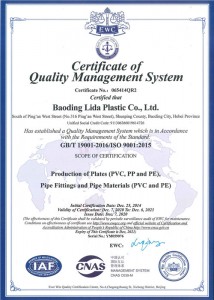окт . 17, 2024 02:00 Back to list
pvc irrigation pipe
The Advantages of PVC Irrigation Pipe
Irrigation is a critical component of modern agriculture, allowing farmers to optimize water usage and ensure healthy crop growth. Among the various materials available for irrigation systems, PVC (Polyvinyl Chloride) has gained popularity due to its numerous advantages. This article explores the benefits of using PVC irrigation pipe in agricultural practices.
Cost-Effectiveness
One of the primary reasons for the widespread adoption of PVC irrigation pipes is their cost-effectiveness. PVC is relatively inexpensive compared to other materials, making it attractive for farmers working within tight budgets. The affordability of PVC pipes enables farmers to install extensive irrigation systems without incurring substantial costs, thereby enhancing agricultural productivity.
Durability and Longevity
PVC pipes are renowned for their durability and longevity. They can withstand various environmental conditions, including extreme temperatures and corrosive soils. Unlike metal pipes, which can rust or corrode over time, PVC pipes maintain their structural integrity, reducing the need for frequent replacements. This durability translates into lower maintenance costs and increased efficiency over the lifetime of the irrigation system.
Lightweight and Easy to Install
Another advantage of PVC irrigation pipes is their lightweight nature. This characteristic makes them easy to handle and install. Farmers do not require heavy machinery or extensive manpower to set up PVC irrigation systems, resulting in lower labor costs. The straightforward installation process allows for quicker implementation of irrigation solutions, which can be critical during planting seasons.
pvc irrigation pipe

Chemical Resistance
PVC pipes exhibit excellent resistance to a variety of chemicals, including fertilizers and herbicides commonly used in agriculture. This resistance is crucial as it ensures the longevity of the pipes and prevents contamination of the water supply. Farmers can apply chemicals without worrying about the degradation of their irrigation systems, thus maintaining optimal efficiency.
Versatility in Applications
The versatility of PVC irrigation pipes makes them suitable for various applications, including drip irrigation, sprinkler systems, and surface irrigation. They can be easily customized to meet the specific needs of different crops and soil types. This adaptability allows farmers to implement precise irrigation techniques, which can lead to improved water conservation and higher crop yields.
Environmental Considerations
Using PVC pipes also supports environmental sustainability. PVC is recyclable, and advancements in recycling technologies have made it possible to repurpose used PVC into new products. By choosing PVC for irrigation systems, farmers can contribute to reducing plastic waste and promoting a circular economy.
Conclusion
In conclusion, PVC irrigation pipes offer numerous benefits that make them an ideal choice for modern agricultural practices. Their cost-effectiveness, durability, lightweight nature, chemical resistance, versatility, and environmental sustainability provide farmers with reliable solutions for efficient irrigation. As the demand for sustainable farming practices continues to rise, the role of PVC irrigation pipes in optimizing water usage and enhancing crop production is likely to grow even more significant. Embracing PVC technology can lead to healthier crops, better water management, and a more sustainable agricultural future.
-
PVC Transparent Sheet Roll - Durable & Flexible PVC Plastic Sheet Roll for Industrial & Home Use
NewsJun.24,2025
-
High-Quality PVC PPR Pipes and Fittings Durable ERA PPR Solutions
NewsJun.10,2025
-
High-Quality Large HDPE Sheets & Large Diameter PVC Pipe Durable Large PVC Pipe Supplier
NewsJun.10,2025
-
High Density Polyethylene Cutting Board - Durable & Food Safe
NewsJun.09,2025
-
3 Inch PVC Pipe for Durable Irrigation Affordable & Reliable
NewsJun.09,2025
-
Premium PPR Plastic Water Pipe Fittings - Durable & Leak-Free
NewsJun.09,2025

